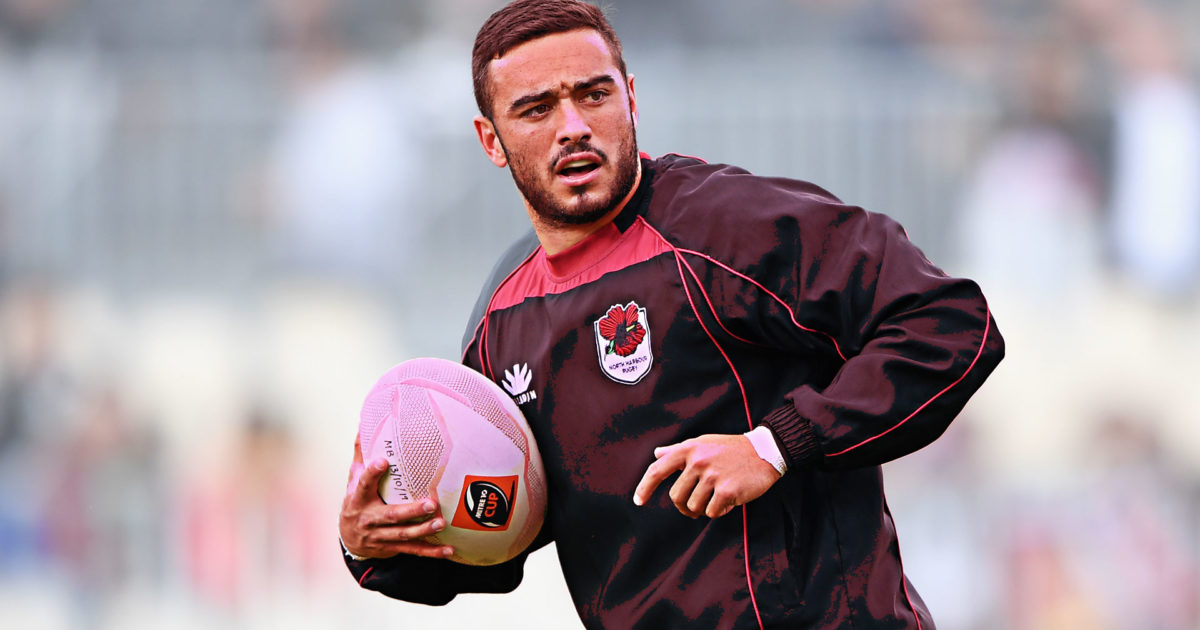Bryn Hall's biggest regret: 'To this day, it still really hurts because we had such a great team and it's unfortunate that we didn't get the job done'

Sitting on three Super Rugby titles in the last three years, it’s safe to say that Bryn Hall’s transition from the Blues to the Crusaders has been fairly successful.
The North Harbour halfback is in his eighth season of Super Rugby and spent his first four years with his native Blues side before making the move south.
While those years in Auckland didn’t reap too much on-field success for the 28-year-old, primarily due to a run of unfortunate injuries, they helped shaped Hall’s future with the Crusaders.
You have to go further back, however – before Hall was picked up by the Blues, before he even ran out in North Harbour colours for the first time – to get to the period that really helped forge the halfback’s passion for the game.
In fact, despite proudly donning the Harbour hibiscus since he turned professional, Hall grew up south of the Harbour Bridge and was schooled at St Peter’s College in Auckland.
In 2000, four years before Hall arrived at the school, St Peter’s won their first outright Auckland schools title, though they had previously shared first place in 1987 and 1988.
Since that 2000 win, however, the school had enjoyed little success on the rugby field – although that slowly started to change, coinciding with Hall’s entrance, as well as that of future stars such as Ben Lam, Patrick Tuipulotu and Peter and Francis Saili.
“I guess during my time at St Peter’s, we were fortunate enough that those boys were kept on together as a group,” Hall told RugbyPass.
“The best thing about St Peter’s for me was that we were all homegrown. I know Patty came from Western Springs College but Pete and all the other boys had come up together through U14’s, U15’s so we had a really good understanding of what the school was about.
“We didn’t win a lot to begin with but we stuck at it and went through the age groups together and had a real understanding of where we wanted to take the program.”
Things started to take a turn for the better as Hall and his teammates progressed through their schooling at St Peter’s.
By the time Hall had reached his final two years at the college, the squad had come together well and had enough quality amongst their ranks to be able to challenge for the title – but it wasn’t to be.
“We got ourselves in a position where we were a really good team and we were unfortunate not to win,” Hall said. “In fact, we probably choked actually in 2009.
“To this day, it still really hurts because we had such a great team and it’s unfortunate that we didn’t get the job done two years in a row.
“But it was still a great team to be a part of. The best thing about St Peter’s is that we actually are all still pretty good mates – which comes back to the school that we went to.”
The current global pandemic has hampered rugby at all levels of the game in 2020 but it’s perhaps the schoolboys that will feel the most hard-done by.
Anyone who watched 2019's Mitre 10 Cup would tell you that Lincoln McClutchie was one of the best first fives on display. Why, then, wasn't the pivot playing Super Rugby this year? @TomVinicombe reveals all. #SuperRugby #TopLeaguehttps://t.co/1hAsn0fWC6
— RugbyPass (@RugbyPass) May 7, 2020
Even if the current season of professional rugby were called off, most of the men and women involved would be back to fight another day.
For students who were looking forward to a final stint in their school’s first XV, however, their journeys may have come to an end.
In New Zealand, the national championships – the cream of the school rugby calendar – have already been called off and there’s still a very real possibility that contact sports will be absent from the calendar altogether.
That impact will be felt two-fold: the players themselves will naturally be hugely disappointed that everything they’ve been working towards, likely for a number of years, has come to the most anti-climactic of ends, but there’s also the fact that rugby-mad New Zealand will be lacking its most passion-inducing competition from the 2020 season.
“You gets the crowds and the passion and rivalries that you see at school because you’re at school with your mates every single day,” Hall said.
“Your close friends are your supporters on the sidelines and the men and women who teach you are there too and you’ve got a connection with them. It’s just so pure.
“I think when you start to go to professional rugby, you lose that a little bit and it becomes more of a business. Don’t get me wrong – playing for your home province and your club and your Super Rugby team is awesome but that ecstasy of playing with your mates and that kind of pure feeling, you just don’t quite get that.”
While Hall’s final years of college rugby didn’t quite go to plan, his seasons weren’t interrupted by any acts of God or global pandemics – but that doesn’t mean the losses haven’t left a mark or their own.
“When you get an opportunity to try and win for your school and you don’t get that job done, it still hurts,” Hall said.
“I’ve been gone a decade now but those memories are still embanked right in my core. I still remember, that’s for sure.”











































































